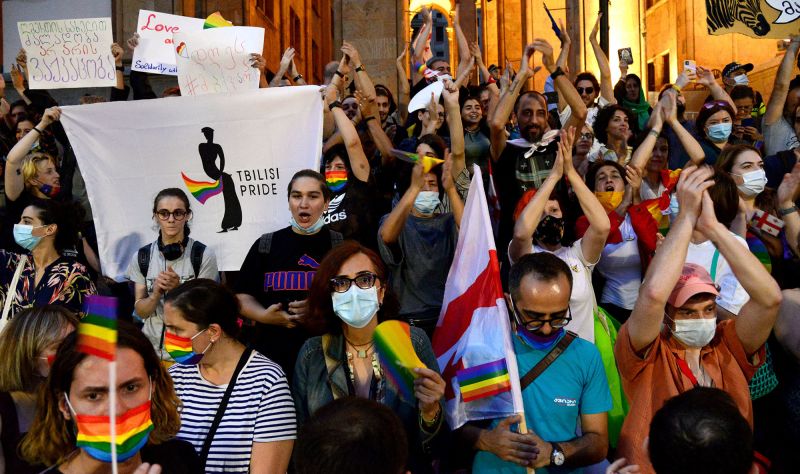Georgian Parliament Speaker Takes Stand Against LGBT Rights
 The recent signing of a law by the Georgian parliament speaker, Irakli Kobakhidze, has sparked controversy and outrage among various groups advocating for LGBTQ+ rights. The legislation in question restricts the portrayal of homosexuality to minors, effectively curbing the rights of the LGBTQ+ community in Georgia.
The new law, which provides for fines ranging from 300 to 1,000 lari for disseminating information about homosexuality to minors, has drawn criticism for its potential to perpetuate discrimination and further marginalize LGBTQ+ individuals in the country. The law is seen as a regressive step that contradicts principles of equality and human rights.
Opponents of the law argue that it infringes on freedom of speech and expression, as well as the right to access information. By restricting the dissemination of information about LGBTQ+ issues, the law limits the ability of individuals to learn about and understand diverse sexual orientations and gender identities.
Critics also point out that the legislation reinforces harmful stereotypes and stigmatizes LGBTQ+ individuals, creating a hostile environment that can lead to discrimination, violence, and other forms of harm. By limiting access to information and restricting discussions about LGBTQ+ rights, the law contributes to the erasure of LGBTQ+ voices and experiences in Georgian society.
In response to the signing of the law, activists and organizations advocating for LGBTQ+ rights have expressed their outrage and disappointment. They have called for the repeal of the legislation and the protection of the rights and dignity of LGBTQ+ individuals in Georgia.
The international community has also condemned the new law, with various human rights organizations and foreign governments calling on Georgian authorities to uphold human rights standards and protect the rights of LGBTQ+ individuals. Many see the law as a setback for progress on LGBTQ+ rights in the country and a violation of international human rights norms.
Despite the backlash and protests against the law, the Georgian government has defended its decision, stating that the legislation is aimed at protecting children from harmful information and promoting traditional family values. Supporters of the law argue that it is in line with Georgian cultural and social norms and that it reflects the views of the majority of the population.
The signing of the law curbing LGBTQ+ rights in Georgia has raised important questions about the state of human rights and democracy in the country. It is crucial for policymakers, civil society, and the international community to continue advocating for the protection of LGBTQ+ rights and challenging discriminatory laws and practices that undermine equality and inclusion. The fight for LGBTQ+ rights in Georgia is far from over, and it is essential for all stakeholders to work together to create a more inclusive and equal society for all.
The recent signing of a law by the Georgian parliament speaker, Irakli Kobakhidze, has sparked controversy and outrage among various groups advocating for LGBTQ+ rights. The legislation in question restricts the portrayal of homosexuality to minors, effectively curbing the rights of the LGBTQ+ community in Georgia.
The new law, which provides for fines ranging from 300 to 1,000 lari for disseminating information about homosexuality to minors, has drawn criticism for its potential to perpetuate discrimination and further marginalize LGBTQ+ individuals in the country. The law is seen as a regressive step that contradicts principles of equality and human rights.
Opponents of the law argue that it infringes on freedom of speech and expression, as well as the right to access information. By restricting the dissemination of information about LGBTQ+ issues, the law limits the ability of individuals to learn about and understand diverse sexual orientations and gender identities.
Critics also point out that the legislation reinforces harmful stereotypes and stigmatizes LGBTQ+ individuals, creating a hostile environment that can lead to discrimination, violence, and other forms of harm. By limiting access to information and restricting discussions about LGBTQ+ rights, the law contributes to the erasure of LGBTQ+ voices and experiences in Georgian society.
In response to the signing of the law, activists and organizations advocating for LGBTQ+ rights have expressed their outrage and disappointment. They have called for the repeal of the legislation and the protection of the rights and dignity of LGBTQ+ individuals in Georgia.
The international community has also condemned the new law, with various human rights organizations and foreign governments calling on Georgian authorities to uphold human rights standards and protect the rights of LGBTQ+ individuals. Many see the law as a setback for progress on LGBTQ+ rights in the country and a violation of international human rights norms.
Despite the backlash and protests against the law, the Georgian government has defended its decision, stating that the legislation is aimed at protecting children from harmful information and promoting traditional family values. Supporters of the law argue that it is in line with Georgian cultural and social norms and that it reflects the views of the majority of the population.
The signing of the law curbing LGBTQ+ rights in Georgia has raised important questions about the state of human rights and democracy in the country. It is crucial for policymakers, civil society, and the international community to continue advocating for the protection of LGBTQ+ rights and challenging discriminatory laws and practices that undermine equality and inclusion. The fight for LGBTQ+ rights in Georgia is far from over, and it is essential for all stakeholders to work together to create a more inclusive and equal society for all.
If you would like to delve into the world of investment topics , go to our partner project Wall Street Wizardry
